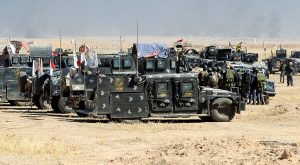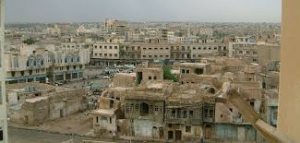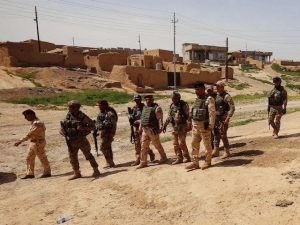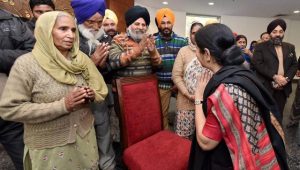 The battle lines are drawn for retaking the last terrorist citadel in Iraq. With 25000 of Iraqi soldiers trained and armed by US and its allies, 5000 battle-hardened members of the Kurdish militia Peshmarga, an assortment of Shia militias called Al Hashad Al Shabi groomed by Iran and groups of Sunni tribal fighters in hundreds trained by Turkish army encircling an estimated 10,000 Jehadist fighters of various nationalities in Mosul of the so-called Islamic State in Iraq and Syria (ISIS), the stakes are higher than ever.
The battle lines are drawn for retaking the last terrorist citadel in Iraq. With 25000 of Iraqi soldiers trained and armed by US and its allies, 5000 battle-hardened members of the Kurdish militia Peshmarga, an assortment of Shia militias called Al Hashad Al Shabi groomed by Iran and groups of Sunni tribal fighters in hundreds trained by Turkish army encircling an estimated 10,000 Jehadist fighters of various nationalities in Mosul of the so-called Islamic State in Iraq and Syria (ISIS), the stakes are higher than ever.
From all accounts, it is now only a matter of time before the jihadists die in the fighting or flee from Mosul or surrender to the military, after inflicting considerable damage on the attacking forces. Judging by the time taken to evict the ISIS from their other strongholds like Tikrit and Ramadi, the Mosul battle will be a prolonged affair lasting months before a closure is reached. The course and the outcome of the fighting carries a wide range of implications for Iraq, the West Asian region and the West itself, both in symbolic as well as substantive terms.
Why Mosul matters?
 Apart from being Iraq’s second largest city, Mosul is also its biggest Sunni city with a mixed population. It has nurtured ancient civilizations and is a repository of a great cultural and historical heritage dating back to Assyrian rulers of B.C period, whose surviving artefacts suffered at the hands of IS cohorts. In the days of the Roman Empire, the city used to be a principal gateway for Asia’s trade with Europe. In the aftermath of the World War I, England, France and the Cembalist Turkey contested for its control, partly due to its strategic location and partly for its presumed proximate oil reserves, with the UK’s wish eventually prevailing.
Apart from being Iraq’s second largest city, Mosul is also its biggest Sunni city with a mixed population. It has nurtured ancient civilizations and is a repository of a great cultural and historical heritage dating back to Assyrian rulers of B.C period, whose surviving artefacts suffered at the hands of IS cohorts. In the days of the Roman Empire, the city used to be a principal gateway for Asia’s trade with Europe. In the aftermath of the World War I, England, France and the Cembalist Turkey contested for its control, partly due to its strategic location and partly for its presumed proximate oil reserves, with the UK’s wish eventually prevailing.
For Iraq, reclaiming Mosul from the ISIS is laden with military, political and strategic imperatives. Freeing Mosul and its million-plus residents is a task cut out for the Iraqi Army to redeem its professional honour. It had lost the city and its surrounding area to a much smaller ISIL force in a matter of hours in June 2014 despite having a well-armed garrison, and leaving behind huge quantities of weapons, ammunition, vehicles and vast amounts of cash in the treasury and local banks. The Mosul seizure by the ISIS was followed by the capture of other Sunni-majority cities like Tikrit and Falluja and Ramadi in close succession. It took more than a year for the Iraqi army, with help from US and local militias, to shape up, turn the tide and force ISIL’s retreat. Having proved its battle-worthiness in the retaking of Tikrit, Ramadi and Falluja occupied by the jihadists, the Iraqi Army now has to complete the mission by uprooting ISIL from Mosul. The preparations for the Mosul attack have been under way for months. The oil wells and villages close to Mosul have since been cleared of the ISIS control by a joint operation of the army and the Kurdish militia with minimal casualties.
The battle for Mosul which is a well-spread out city with rows and rows of independent houses may prove to be a tough one with the IS strategy centring on urban guerrilla fighting , street to street and house to house, using snipers, booby traps, suicide attacks and improved explosive devices. The Mosul dam built on the Tigris river four decades ago, a short distance from the city and lacking in proper maintenance for a decade, could be a potent weapon which, if breached, could devastate hundreds of miles of area downstream with flooding as far as Baghdad.
Liberation of Mosul: What it means for region
 The Iraqi government has retaken over the last one year other places under ISIS control. The liberation of Mosul has, however, special significance. Its re-conquest carries high symbolism, being the strategic hub of the Islamic Caliphate, proclaimed on June 28, 2014 by Abu Bakr Al-Baghdadi from pulpit in a local mosque, which has attracted recruits to the so-called jihad from all over the world. For the rest of the world, the collapse of the jihadist nerve centre in Mosul will dampen the self-radicalization urge among sections of the youth in far corners of the world, including India and consequently the lone-wolf attacks should see a decline. For ISIS, the fall of Mosul means the demise of the Caliphate its global jihad dreams. It could also mean the liquidation or change of its top leadership. There have been worries in Damascus about the possibility of the IS fanatics escaping from Mosul and sneaking into neighbouring Syria and joining in the fight against Assad regime.
The Iraqi government has retaken over the last one year other places under ISIS control. The liberation of Mosul has, however, special significance. Its re-conquest carries high symbolism, being the strategic hub of the Islamic Caliphate, proclaimed on June 28, 2014 by Abu Bakr Al-Baghdadi from pulpit in a local mosque, which has attracted recruits to the so-called jihad from all over the world. For the rest of the world, the collapse of the jihadist nerve centre in Mosul will dampen the self-radicalization urge among sections of the youth in far corners of the world, including India and consequently the lone-wolf attacks should see a decline. For ISIS, the fall of Mosul means the demise of the Caliphate its global jihad dreams. It could also mean the liquidation or change of its top leadership. There have been worries in Damascus about the possibility of the IS fanatics escaping from Mosul and sneaking into neighbouring Syria and joining in the fight against Assad regime.
On another plane, the victory in Mosul, meaning the end of ISIS in Iraq, will be a shot in the arm for the Iraqi premier Hyder Abadi, facing political battles within his party and inside the Parliament and will help consolidate his wobbly hold on the government and the party.
For the West Asian region, the fall of Mosul would stave off challenges of a sectarian implosion, forestalls a Sunni Jehadist proto-state and also sets at rest the apprehension about opening of a Pandora’s box from an unravelling of the century-old Sykes-Picot geo-political configuration of West Asia that created Iraq out of the erstwhile Ottoman empire. For thousands of Kurds, Yazidis and Assyrian Christians who have been inhabitants of Mosul and nearby places for centuries and were singled out for the worst form of brutalization by ISIL, the Mosul fighting is a sign of hope and promise of better times and end of their refugee status, heralding the return to their abandoned homes with a secure future. Their apocalyptic existence under the ISIS control has led to clamour for separate enclaves near Mosul with security guarantees by the West. The Kurds, who have been in the forefront in fighting ISIL, have indicated their demand to add to their Kurdistan Autonomous Region, the areas they have captured from ISIL, citing their historical claims to the areas and the loss of their men in thousands in the fighting.
Test for US Middle East policy
The Mosul campaign is a test for US President Obama’s Middle East policy of excluding “US boots on the ground” in fighting terrorism but supporting the affected countries in their own fighting with US and the allied assistance made available in broadly six strands: 1.Training of the army 2. Supply of weapons and ammunition 3. Air support 4. Battle field guidance and advice 5. Real time intelligence and 6. Action by Special Forces. The US support has helped Iraq decisively in earlier campaigns in evicting ISIL from Tikrit, Ramadi and Falluja.
The ongoing fight for Mosul is noteworthy for another reason. Russia has shown no great interest in fighting ISIL in Iraq although it is engaged in decimating it in neighbouring Syria, probably because the Iraqi government made no appeal to Moscow for help in Mosul lest it should upset US. Russia is, however, concerned that ISIS fighters escaping from Mosul would join its units fighting the Assad regime in Syria for whose defence, Russia has made firmly commitment. In any case, the Iranian sway in Baghdad safeguards Russian regional interests in Iraq and Moscow has reason to be content in not being a party to the Mosul liberation.
While the fall of Mosul to the coalition forces is only a matter of time given the relative strengths of the two sides, whether the defeat of ISIS will bring a closure to the sordid chapter is an open question. Though united in fighting the ISIS, the divergent political agendas of the Kurdish militia, Sunni tribal fighters, Shia militia and the government forces are likely to generate friction in the post-liberation settlement. It also remains to be seen whether the Turkish soldiers at Bashica near Mosul to train Sunni tribal fighters will withdraw from the Iraqi territory. The refugee issue is going to be another paramount concern. Major powers, countries in the region and multilateral formations like the UN, EU, UNHCR, and IOM have voiced concerns about the magnitude of the task. Resource mobilization has proved to be a great constraint. Housing, food and health needs of hundreds of refugees require massive funding.
What’s at stake for India?
 There are historical and as well as recent links between India and Mosul. People’s travel between Mosul and India dates back to at least the 4th century AD. The Malabar Coast in south-west India drew priests from the monasteries in and around Mosul for centuries on missionary work. Some of them lay buried in churches near Thrissur. Youth in dark sack-cloth from the Malankara Church in Kerala, a branched-off denomination of the Assyrian church, used to stay in the monasteries in the war zone until 2003 for short periods for theological studies. Mosul University had employed in the 1970s and eighties Indian professors in science and maths faculties, whose students are nostalgic about their teaching. In the 1980s, India’s Public Sector Undertaking built a 5-star hotel for the Iraqi State Organization of Tourism in Mosul which is now occupied by the ISIS for recreation.
There are historical and as well as recent links between India and Mosul. People’s travel between Mosul and India dates back to at least the 4th century AD. The Malabar Coast in south-west India drew priests from the monasteries in and around Mosul for centuries on missionary work. Some of them lay buried in churches near Thrissur. Youth in dark sack-cloth from the Malankara Church in Kerala, a branched-off denomination of the Assyrian church, used to stay in the monasteries in the war zone until 2003 for short periods for theological studies. Mosul University had employed in the 1970s and eighties Indian professors in science and maths faculties, whose students are nostalgic about their teaching. In the 1980s, India’s Public Sector Undertaking built a 5-star hotel for the Iraqi State Organization of Tourism in Mosul which is now occupied by the ISIS for recreation.
As for India, the immediate concern is the fate of its 39 workers missing from a construction site in Mosul since June 2014 and remained untraceable despite massive efforts by the government. Though receiving sympathetic assurances about their existence from different sources in the region, no concrete lead has surfaced too actually to locate them or contact them. The fall of Mosul is likely to throw light on their whereabouts and bring closure to this long night of ordeal for Indian captives.
(R. Dayakar is a former ambassador of India to Iraq and a commentator on issues relating to the Middle East region. This article has been written for India Writes Network).
Author Profile
- India Writes Network (www.indiawrites.org) is an emerging think tank and a media-publishing company focused on international affairs & the India Story. Centre for Global India Insights is the research arm of India Writes Network. To subscribe to India and the World, write to editor@indiawrites.org. A venture of TGII Media Private Limited, a leading media, publishing and consultancy company, IWN has carved a niche for balanced and exhaustive reporting and analysis of international affairs. Eminent personalities, politicians, diplomats, authors, strategy gurus and news-makers have contributed to India Writes Network, as also “India and the World,” a magazine focused on global affairs.
Latest entries
 DiplomacyJanuary 5, 2026India walks diplomatic tightrope over US operation in Venezuela
DiplomacyJanuary 5, 2026India walks diplomatic tightrope over US operation in Venezuela India and the WorldNovember 26, 2025G20@20: Africa’s Moment – The Once and Future World Order
India and the WorldNovember 26, 2025G20@20: Africa’s Moment – The Once and Future World Order DiplomacyOctober 4, 2025UNGA Resolution 2758 Must Not Be Distorted, One-China Principle Brooks No Challenge
DiplomacyOctober 4, 2025UNGA Resolution 2758 Must Not Be Distorted, One-China Principle Brooks No Challenge India and the WorldJuly 26, 2025MPs, diplomats laud Operation Sindoor, call for national unity to combat Pakistan-sponsored terror
India and the WorldJuly 26, 2025MPs, diplomats laud Operation Sindoor, call for national unity to combat Pakistan-sponsored terror







